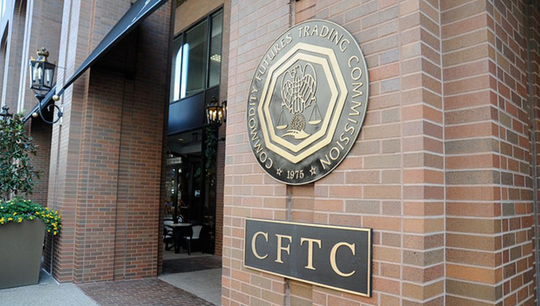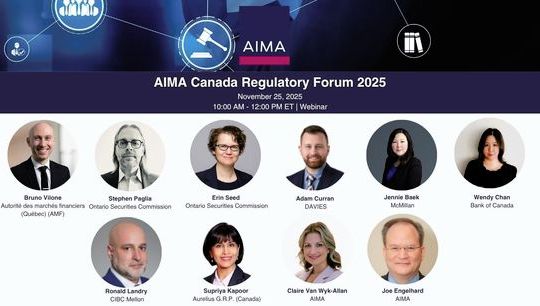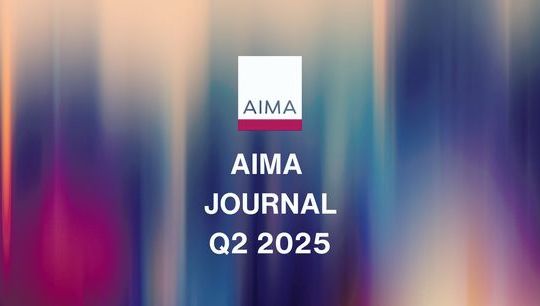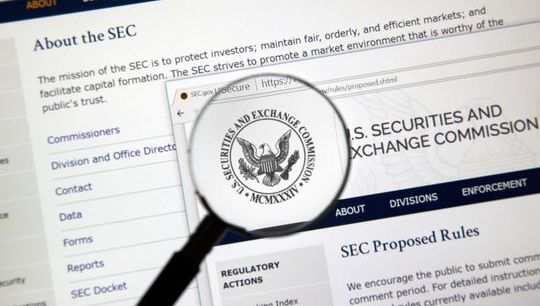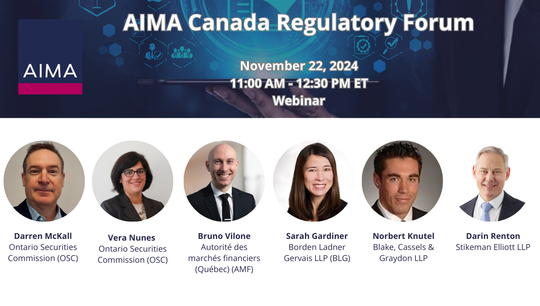Ep. 31 The Long-Short | US regulatory update: What's changed and why?
Published: 15 June 2022
The Long-Short is a podcast by the Alternative Investment Management Association, focusing on the very latest insights on the alternative investment industry.
Each episode will examine topical areas of interest from across the alternative investment universe with news, views and analysis delivered by AIMA’s global team, as well as a host of industry experts.
This week, The Long-Short is joined by AIMA's representative in Washington DC, Daniel Austin, who provides a timely update to the flurry of regulatory activity in the US with the SEC fielding multiple proposals affecting the alternative investment industry. With so much to keep a track of, this episode is essential listening for all parties.
Listen to this episode and subscribe on Spotify
Listen to this episode and subscribe on Apple Podcasts
Listen to this episode and subscribe on Google Podcasts
Listen to this episode and subscribe on Amazon Music
Read the transcript:
Hosts: Tom Kehoe, AIMA; Drew Nicol, AIMA,
Guests: Daniel Austin, Director of US Policy and Regulation, AIMA
Interlude: Dawn Angley, AIMA
Tom Kehoe, AIMA 00:05
Hello and welcome to the Long Short, a new podcast brought to you by AIMA the Alternative Investment Management Association, focusing on the very latest insights on hedge funds and private credit. My name is Tom Kehoe. AIMA is the global representative of the Alternative Investment Industry with around 2,000 corporate members spread across 60 countries. Of these are fund manager members account for approximately two and a half trillion dollars in hedge fund and private credit assets. Each weekly episode of the Long Short will examine topical areas of interest from across the alternative investment universe with news views and analysis delivered by AIMA’s global team, as well as a host of industry experts. So, whether you're a hedge fund or private credit industry veteran, a student of the industry, or just someone interested in learning more about hedge funds and private credit, this podcast will be your ideal companion to help navigate you to the long and short of this fascinating industry.
Hello and welcome to episode 31 of the Long Short. And this week we catch up with AIMA’s Daniel Austin, Director of US policy and regulation to get an update on the key regulatory issues impacting the private funds industry.
Drew Nicol 01:13
Over the next 30 minutes. Daniel recaps the industry view regarding the private funds proposal. His reaction to the new SEC proposals to include certain market participants as dealers, or government securities dealers. The trio of proposals out of the SEC’s Division of Trading and Markets that relate to the reporting of securities loans, securities-based swaps, and short sales, as well as new rules being proposed regarding ESG disclosure.
Tom Kehoe
Indeed a significant undertaking by our US based team and all of this, of course cannot be achieved without the significant input from our members and the various working groups that they participate in.
Drew Nicol
We trust that you find this episode useful. And if you do, please like, and rate the show on your preferred podcast platform so that others can find our content too.
Tom Kehoe 02:02
Earlier in the spring, we spoke with AIMA’s Daniel Austin, Director of US policy and regulation to get his reaction to the wide sweeping proposals being put forward by the SEC regarding the private funds industry, as well as other proposals impacting on the alternative funds industry.
Drew Nicol
With the deadline for industry feedback on the private funds proposal now past we thought now would be a good time to check in with Daniel and get an update on these and other US Industry Regulatory developments.
Daniel, welcome back.
Daniel Austin
Tom, Drew. Thanks for having me back. And happy to chat again.
Tom Kehoe
Daniel, the last time you joined us on the Long Short, we discussed a flurry of SEC proposals that were released in February including the private funds proposal, as well as proposals that were issued in Q4 of last year. Could you update our listeners on this, and other SEC engagement AIMA has conducted since the beginning of the year?
Daniel Austin, AIMA 02:52
Sure, Tom. Yeah. The last time I spoke with you guys. In the spring. It was quite a time. February was probably a one-of-a-kind month in terms of proposals out of the SEC. Maybe, we haven't seen anything like it since after Dodd Frank. Like you mentioned a second ago the private funds proposal. So, there was proposal for cybersecurity for advisors and Registered Investment Companies, there was the proposal to accelerate the settlement time from two days to one day. So other words, T +1, and then changes to the beneficial ownership regime, which are scheduled 13, D and G and then finally a short selling proposal and the reopening of the securities lending comment period. At that time, AIMA was also working on responses to Form PF amendments and the securities-based swaps reporting proposal.
And I think I counted it up. Since I believe Q4 last year, there have been 30 proposed or reopen comment periods, which is just extraordinary. To date AIMA has responded to 11 of those and we plan to respond to at least three more of those pending and may be providing supplemental materials to others. We've also engaged with several of the commissioners and staff. We've met with Commissioners Crenshaw, Purse, and Lee, and other meetings with staff - The Division of Investment Management on the private funds’ proposal, Form PF, and the cybersecurity rulemaking. We've met with Trading and Markets on short selling securities-based swaps and securities lending. And then finally, corporate finance on the beneficial ownership proposal. But it's been quite a couple of months for the AIMA GRA staff that is particularly focused on our US matters.
Tom Kehoe 04:43
So, this is our government and regulatory affairs team, of course. With yourself based in DC Daniel and then of course, we've got our other colleagues spread across the country (US) not to mention the global (reach of our staff) and influence that we have across our membership and all of that working together with the wider industry makes for a very impactful engagement.
Drew Nicol 05:07
Yeah, a huge amount there to unpack. So, I'm just going to take those in order just for my own benefit as much as for our listeners. When we last spoke, you mentioned that the private funds proposal was probably one of the most significant rulemakings, a US financial regulator has undertaken, at least in recent years, particularly about the asset management industry. Could you just remind our listeners about this proposal? And update them with the industry arguments that AIMA has put forward in reaction to the proposal?
Daniel Austin 05:41
Of course, yeah, and, and like I said, it's certainly a significant rulemaking we've seen reports from the (Wall Street) Journal, the FT other newspapers, reporting on this particular proposal over the past several months. So the proposal - a brief overview, some of the high level items, it's a pretty lengthy proposal, probably over 350 pages, with hundreds (I think about in total over 800) questions in the proposal. So it would require each private fund to determine if a fund is a liquid or a liquid fund to prepare a quarterly statement for that fund would also require each fund that a registered investment advisor advises to undergo a financial statement audit, there would also be prohibitions around preferential treatment in other words, side letters and other arrangements. And then finally, it would prohibit charging certain fees and expenses to a private fund or its investments, and also prohibit certain limitations of liability among other significant changes to the relationship between an LP and a GP.
In our response, AIMA laid out several main points for the Commission to consider. The proposal was really developed without sufficient consideration of the sophistication of private fund investors, the Commission seems to paint all investors as a, (for lack of a better term), a mom and pop investor, when in reality, these are very sophisticated institutional investors that have strong outside representation from law firms and others. The proposal also really failed to conduct an appropriate cost benefit analysis, which is something that if you talk to many in the industry is something that is consistent among most, if not all of the recent proposals that we've seen. And I'll get into that, shortly when we talk about the dealer proposal.
AIMA also discussed the quarterly statement requirement and that it would be unnecessary and duplicative. The mandatory audit requirements would eliminate the surprise examination option in the custody rule for advisors, and would also be burdensome for non US private fund advisers, and that the limitation of liability would probably be one of the most significant aspects of the proposal. In our response, we argued that the limitation of liability would ignore decades of standard industry practice and impose a greater standard of care on private fund advisers than unregistered fund advisors with respect to retail investors, which is an incredible departure from the current industry practice, these changes will likely lead to an increase in management fees. And this is something that the Commission seems to perhaps ignore or not consider in the proposal. Finally, the prohibition on preferential treatment and side letters would significantly disrupt existing commercial arrangements. I believe the implementation period for a final rule would be one year from publication in the Federal Register. So this would require funds and their investors to renegotiate nearly every document that they've any type of side letter or other item that may be deemed preferential treatment within a year. So it would certainly, it would make mean a lot of work for the fund lawyers out there. It would also chill communications between advisors and investors and limit their ability to receive personalised and favourable terms going forward.
Tom Kehoe
Daniel, another very consequential rulemaking that the Commission has undertaken has to do with revisions to the definitions around dealer and government securities dealer. Why is this rulemaking so significant, and what would it mean for asset managers in the markets that they operate in?
Daniel Austin
Yeah, Tom, this is probably if you asked our members about the top two rules that the SEC has proposed in terms of, I guess significance or impact on the industry. The private funds proposal would probably be number one, and then the dealer proposal would be a close number two. The Commission has proposed to amend the definitions of dealer and government securities dealer to focus on market participants that they deem would routinely provide liquidity. They propose three qualitative standards and one quantitative standard that relates just to government securities. The proposal appears to focus primarily on principle trading firms. But hedge funds and private fund advisors would also be captured if any of the standards are met and will be required to register as either a dealer or government securities dealer.
In our response AIMA highlighted the incredible direct and indirect cost on market participants to register and comply with the dealer regime. The Commission's estimates, even for the smallest of entities would estimate that it would cost around over a million dollars for initial registration with the Commission and then to become a member of the consolidated audit trail plus hundreds of thousands of dollars in annual cost and compliance. We believe and many others have a similar line of thinking that this will lead to a change of behaviour, insecurities and government securities market. And that it will have a negative impact on efficiency, competition, capital formation and liquidity. However, the Commission in the proposal, although it acknowledges that this could occur. In their estimate, they say, that “this impact is uncertain”. They don't make any attempt to try to put into, you know, quantitative terms or qualitative terms, what impact this might have. And it goes back to the comment I made earlier the there's a lack of a thorough and appropriate cost benefit analysis in many of these rules. Even if a rulemaking like this went forward, and members like ours, hedge funds and advisors would be required to register as dealers, the Commission in the proposal gives no explanation or guidance as to how the dealer framework would work for funds and advisors.
It would be trying to put a square peg into a round hole, for example, the net capital rule - would it apply to the fund? Would it apply to the advisor? How would that work? Is it even possible? It seems to assume that existing organization and structures that are out there in the private funds industry would just neatly fit into a new deal or regime. And that's one of the points we really tried to hit home with in our response and encourage the Commission for any final rule to exclude private fund advisers and the funds they manage from any final rule, and any type of possible subjection to becoming a dealer. We also argued to withdraw the quantitative standard because there's no basis for determining dealer status. And it would really capture a number of unintended entities that are engaged in cash management. For example, it's a $25 billion threshold over a course of four out of the prior six months. And if you look at an event, if there's a dash for cash, or a sell off in in treasury securities, whatever it may be, large pensions, insurers, even sovereign wealth funds could technically be captured under this quantitative standard. We also explained that there needs to be a reassessment of the qualitative standards, because as they're written, they're incredibly ambiguous. This draft (proposal) would capture hundreds of funds that even engaged in the most traditional hedge fund strategies that have never considered or have never been considered nor associated with dealing.
Dawn Angley 14:27
AIMA is delighted to host our annual conference dedicated to ESG this September the eighth in London. The full day programme will address the basics of ESG integration, the latest developments and investor demands, new trends and themes and the regulatory updates the firms need to know about. This is a prime opportunity to network with the industry and to hear unparalleled insights from speakers about how to approach responsible investment techniques across a range of strategies. To register or to find out more visit the AIMA website (www.aima.org) we hope to see you there.
Drew Nicol 15:06
Daniel apologies. I'm going to have to jump around a little bit here. But there's just so much to get through. And I wanted to get back to the trio of proposals that you mentioned earlier, out of the SECs Division of Trading and Markets that related to the reporting of securities loans and securities-based swaps, and short sales, the latest being the short sale proposal, which is notably different from the other two. Can you just help our listeners understand what the difference is with this short sale proposal compared to the other two?
Daniel Austin 15:38
Sure, Drew, yes. So, at I think it was in Q4 last year the Commission proposed a rulemaking that pertained to securities lending. Loan level data would need to be reported to FINRA within 15 minutes and disclosed as soon as practicable. Legal names to the loan would not be included. But there would be other very granular data that could indicate the market participant or certainly a group of market participants that perhaps could be affecting a loan of that size or nature. Then we saw the securities-based swaps reporting proposal, and that would identify the market participant by name and LEI, and it would be filed T+1 and then that data would become immediately available. And then in February, it was interesting. We saw the short sale proposal, where many in the industry were concerned that the Commission was going to take a route that they did similar to the securities-based swaps proposal. However, they decided to aggregate and anonymize short sale data that managers would report. The disclosure element of the securities lending and securities-based swaps rules in particular would have a number of negative market impacts, impacts that we that we highlighted in our responses to those rulemakings – these being reduced liquidity, forced disclosure, valuable research, front running, and copycat trading. In our responses to securities-based swaps and short sale, we make a point to try to hit home the inconsistencies between these three rulemakings. And also, where there's overlap and questioning why a route similar to the short sale proposal of aggregating and anonymizing data was not taken with securities lending and securities-based swaps.
Tom Kehoe 17:38
And these proposals have come from the same division within the agency. Right. So why then have they taken a different approach than regarding the short sale disclosure? And has then the aggregate effect of these new reporting requirements really being considered or examined?
Daniel Austin 18:01
Yeah, Tom, that's a good point, it is noteworthy to highlight that these three proposals have all come out of the same division within the SEC, the Division of Trading and Markets, yet one of them takes such a different approach than the other two. And it was it was the last in time with these three proposals. However, and I alluded to it earlier there, we did respond to a re-opening of the comment period for the securities lending proposal. And the Commission reopened that comment period simultaneously with proposing its short sale proposal. In our supplemental response to the securities lending proposal, we highlighted the difference between these rules and why the Commission is taking these different routes when it comes to financial products and reporting that have such similarities. And regarding the aggregate effect, we've tried to point that out in our comments, and then also in our meetings. And it's really something that is very worrisome, and not just with these proposals from Trading and Markets. But so many of the others we've seen over the past eight plus months, where there is significant overlap, yet there appears no real consideration of the aggregate impact that these proposals will have on the private fund industry and just the broader financial markets.
Drew Nicol 19:38
And Daniel, we're going to have to change tack once again, which I think again just reiterates the sheer breadth of the proposals that you guys in the US have been facing. But we must - because the SEC has not even slowed down yet either, as it has issued a proposed rule that would, among other things require certain ESG strategy disclosures for funds and advisors, as well as a proposal to amend the names rule. And at the same time, we also saw the CFTC issue a request for information regarding climate related financial risks. So, it appears the CFTC may consider an ESG disclosure framework of their own. So, this begs the question, can you give a brief overview of the SEC's ESG proposal for funds and advisors, and the CFTC ‘s RFI (Request for Information) and what issues may come to pass as results of both agencies seemingly pursuing separate disclosure frameworks? And apologies for the acronym soup?
Daniel Austin 20:45
Right. So, the SEC published two proposals, I guess it was about two or three weeks ago. And you mentioned the names role. And I think more relevant probably for our members is the ESG strategy disclosures for funds and advisors. And we're still reading through that proposal and assessing its ramifications for our members. But at a high level, the proposal would classify three types of funds, integration ESG focused and impact funds, and integration being at the lowest level with impact bonds being at the highest. There are varying degrees of disclosure requirements for those funds. There will be additional disclosures for certain funds, particularly those that are ESG focused and impact funds around proxy voting and engagement and then also greenhouse gas emission reporting. You also mentioned the CFTC request for information on climate related financial risk. That has about I think, 34 or so questions in it on a number of topics. The proposal in the preamble kind of intimated that responses could inform a future rulemaking. And one of the things that that we're concerned about is that many of our members are joint registrants with the CFTC and sec. And we're assuming both agencies finalised rulemaking on the topic would become beholden to new sets of reporting and disclosure requirements. So, we would hope and encourage both agencies to coordinate in these efforts as a common set of criteria it would be useful for investors and more workable and less costly for joint registrants in the process.
Tom Kehoe 22:37
Daniel, the comment period for these rules, have they now closed?
Daniel Austin 22:45
The recent ESG proposals out of the SEC on for funds and advisors and then also the names rule remains open. And the comment period for the climate disclosures for corporate issuers closes on June 15 and AIMA is responding to that.
Tom Kehoe 23:06
Thank you, Daniel and so what then is AIMA’s plan over the summer period regarding these remaining proposals and what work do you have in the pipeline?
Daniel Austin 23:21
So, we will begin and have begun engaging with relevant staff and Commission offices. We've also been monitoring to see when the SEC’s Regulatory Flexibility agenda will be released. That typically lays out rulemakings that are being considered or in the drafting process within the Commission. That has not been released. Yet. We have seen chair Gensler in a recent speech talk about a proposal that would certainly change the market structure for securities in a significant way in regard to payment for order flow, and best execution and other types of topics that came out of the Gamestop event of January 2021.
Drew Nicol 24:16
Well, Daniel, we've absolutely peppered you with questions there. So thank you so much for providing such a valuable update for those of us that aren't able to check in on these many proposals coming out of the US day to day. I'm sure we will have you on the Long Short again, but I hope we have less to talk about next time. Thank you for joining us.
Tom Kehoe 24:37
Thank you, Daniel. Daniel's DC Digest - we'll have you back again very soon.
Daniel Austin 24:43
Thanks, Tom. I like the alliteration.
[Outro] Drew Nicol
The Long Short is brought to you by AIMA the Alternative Investment Management Association the global representative for the Alternative Investment Industry. As always, you can get the latest episodes by subscribing to the Long Short on Spotify. Apple podcasts and Google podcasts or by streaming episodes directly from our website AIMA.org Thanks for listening
Disclaimer
This podcast is the sole property of the Alternative Investment Management Association (AIMA). This audio production and content are intended as indicative guidance only and are not to be taken or treated as a substitute for specific advice, whether legal advice or otherwise. AIMA permits use or sharing of the content in media or as an educational resource, provided always that proper attribution is made. The rights in the content and production, including copyright and database rights, belong to AIMA.


